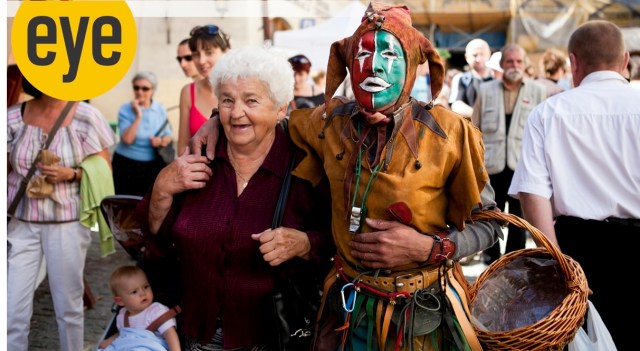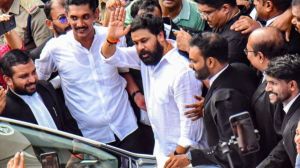‘He guided me without ever telling me — just by his actions’: Adil Hussain
Hussain on the greatest de-conditioning by his mentor Khalid Tyabji
 Khalid Tyabji in costume. (Courtesy: Khalid Tyabji)
Khalid Tyabji in costume. (Courtesy: Khalid Tyabji)I have been one of the luckiest persons in the world to have had teachers who educated me diligently and wholeheartedly at various stages. I am deeply indebted to at least three of them — two of whom want to be anonymous. But I can name Khalid Tyabji, who currently lives in Poland.
May 15, 1990, was my first day at the National School of Drama (NSD) and Khalid was to take our first session at 8 am. Our classroom was a studio without furniture since we worked on the floor, moving and doing action-oriented work. I went in and saw Khalid walking like a monkey between the ceiling and a net that he had made with thick ropes.
Buy Now | Our best subscription plan now has a special price
Khalid taught us for the whole semester of six month every morning and, sometimes, he would come in the evenings, from 6 pm to 10 pm. I had no clue what I was doing. I just followed him. He would start moving and we would copy him. Slowly, Khalid helped us improvise and express, without saying more than one of two sentences as he did not speak much.
Immediately after NSD, I got the Charles Wallace Scholarship to study at the Drama Studio London but, after coming back from the UK, I felt I was still not enough of an actor to perform in front of an audience. That’s when I received an invitation to watch a performance of Khalid, called A Fool’s Song (1993). He was wearing nothing except his underwear and a fool’s cap. The play was a fool’s perspective of the different characters who made up the landscape of India — from the corporate CEO to a tribal man to a religious character — and Khalid depicted them without saying a word. As he was transitioning from one character to the other, I was blown, that was the kind of artistry I wanted to have.
I told Khalid I wished to train with him. He asked, “How much money do you have?’ I had Rs 100. He said, “I am giving you one year to earn Rs 1 lakh, and you must have a motorbike and that, too, an Enfield”. I went to Assam and joined a commercial touring theatre, known as mobile theatres, earned that money and came back with an Enfield. He took me on a tour. We worked together for the next two to three years in different parts of the country, travelling on our motorbikes.
 Adil Hussain (Credit: Express Archive)
Adil Hussain (Credit: Express Archive)
Our first stop was a village called Kurupar in southern Madhya Pradesh, now in Chhattisgarh. We had to walk some 50 km from Jagdalpur town and then climb for one-and-a-half days to come to the village where, in 1995, people hadn’t seen cars, buses, money or matchboxes. We were dressed the way they were — in loincloth. Khalid merged into their society, wrestling with the youngsters, running around and becoming a part of the fun, rituals and their way of living with the ecosystem. He did not tell me what to do and this was an issue with me because I grew up being instructed by my teachers all the time. When I realised Khalid was never going to tell me what to do, I just did what I wanted — and that’s what he wanted me to do.
That was the greatest de-conditioning that happened while we were in Kurupar for a month. What did I want to do? What do I really, really feel like? People who are in the field of art must undergo de-conditioning — from the actions that we think we ought to do, to finding out what we really feel like doing. It is a huge transformation and Khalid’s greatest gift to me as a teacher.
He also insisted that I call him by his name. If I said Sir, he would ignore me. I had already found out that Khalid’s father, Badruddin Tyabji, was one of the first ambassadors of India in Jawaharlal Nehru’s time and his mother, Surayya Tyabji, was among those responsible for designing the Indian flag. He imparted human values to me, apart from being a fantastic acting teacher, who trained each and every part of my muscle in order for it to receive impulses from my innermost core and translate these to recognisable physical language.
Throughout our motorcycle journey, Khalid introduced me to the many people, faces, colours, rituals, customs, food, clothing and behaviours of India. We were just travelling and spending one or two weeks in places we liked. I realise that, at the end of those two years, I was made to become so flexible from within as to be able to see the world from multiple perspectives. Today, when we encounter an event, we generally see one perspective and not the other. George Bush had said, ‘You are either with us, or against us’. This binary of either we are right or the other person is right has had disastrous consequences in society. Actors and artists cannot have this attitude. They must be looking at the truth from billions of perspectives. That is how one becomes flexible and can respect and empathise with different people. I have utmost gratitude and debt towards Khalid who rebirthed me.
I kept learning from his life and actions. I was fortunate that I met him in my early life, because he influenced my life, personality, worldview and ideas of acting, theatre and life. He guided me without ever telling me — just by his actions.
Adil Hussain is an eminent performer on stage and screen
(As told to Dipanita Nath)
- 01
- 02
- 03
- 04
- 05































